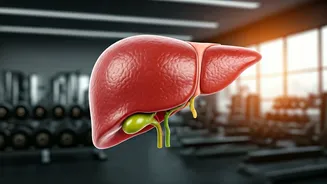Defining Fatty Liver
Non-alcoholic fatty liver disease (NAFLD) is characterized by an excessive buildup of fat within liver cells, even in individuals who consume little to
no alcohol. This condition can stem from various factors, with obesity, insulin resistance, and certain dietary habits being significant contributors. Initially, NAFLD might show no symptoms, often making early detection challenging. However, as the condition progresses, it can lead to inflammation (non-alcoholic steatohepatitis or NASH), scarring, and even liver failure. Early recognition and intervention are key to managing NAFLD. Lifestyle changes, especially increased physical activity, can significantly slow or reverse its progression, highlighting the importance of understanding this prevalent condition.
Exercise's Healing Power
Regular exercise proves to be a powerful tool in combating NAFLD. Physical activity helps in several ways: it reduces fat accumulation in the liver, enhances insulin sensitivity, and decreases inflammation. When you exercise, your body utilizes stored fat as energy, thus decreasing the fat load in the liver. Moreover, exercise improves how your body responds to insulin, which is crucial because insulin resistance often contributes to fat buildup in the liver. Furthermore, the anti-inflammatory effects of exercise can protect the liver from the damage caused by NAFLD. A consistent exercise regimen, therefore, becomes a key component in managing and improving the health of individuals affected by fatty liver disease, promoting better liver function and overall metabolic health.
Recommended Exercise Routines
Creating an exercise plan tailored for NAFLD should blend different types of activities to deliver comprehensive benefits. Aim for at least 150 minutes of moderate-intensity aerobic exercise, such as brisk walking, cycling, or swimming, each week. Breaking this down into 30-minute sessions, five times a week, can be more manageable for many. Complement aerobic exercise with strength training exercises, which help build muscle mass and improve insulin sensitivity. Incorporate resistance training two to three times per week, focusing on major muscle groups. Flexibility and balance exercises, like yoga or Pilates, are also beneficial, as they improve overall physical function and can enhance well-being. Always consult a healthcare provider before starting a new exercise program.
Ideal Exercise Types
When choosing exercises to combat NAFLD, it’s crucial to consider the types of activities that offer the most benefits. Aerobic exercises are at the forefront, because they directly support burning liver fat and improving cardiovascular health. Activities like running, dancing, and even a fast-paced walk can be extremely beneficial. Strength training is another cornerstone of an effective exercise plan. Resistance exercises using weights, resistance bands, or bodyweight exercises can build muscle, which in turn boosts metabolism and increases insulin sensitivity. High-Intensity Interval Training (HIIT) is also effective; it involves short bursts of intense exercise followed by brief recovery periods. HIIT workouts can be particularly time-efficient and provide significant improvements in both liver health and overall fitness. The variety keeps things interesting, increasing adherence to your fitness routine.
Lifestyle Tips: Enhance Results
Beyond regular exercise, other lifestyle adjustments play a crucial role in enhancing the benefits. Diet is central: adopt a balanced diet rich in fruits, vegetables, whole grains, and lean proteins, and avoid excessive sugars and processed foods. Maintaining a healthy weight is vital; if you are overweight or obese, losing even a small percentage of your body weight can have a significant positive impact on liver health. Limit alcohol consumption or abstain altogether, because alcohol can worsen liver damage. Ensure adequate hydration by drinking plenty of water throughout the day. Getting enough sleep is another essential component, as sleep deprivation can affect metabolism and worsen NAFLD. Managing stress through activities like meditation, yoga, or spending time in nature can also positively affect overall health, including liver function.












